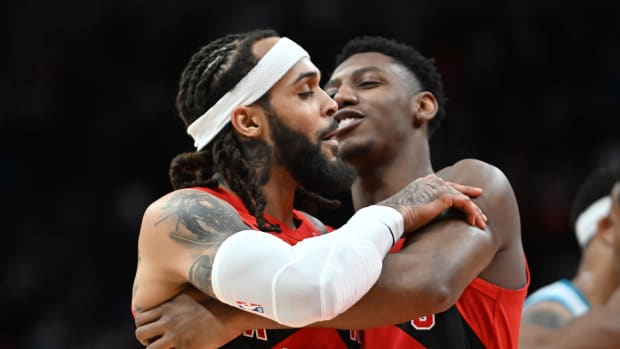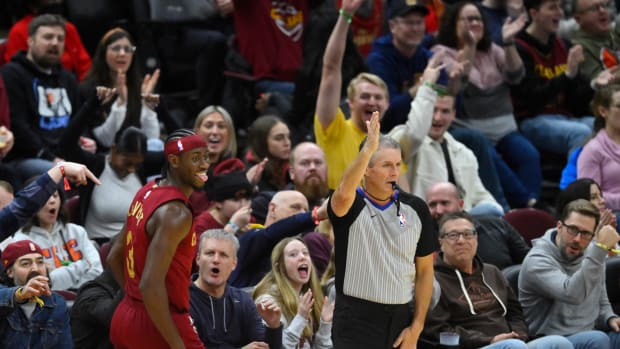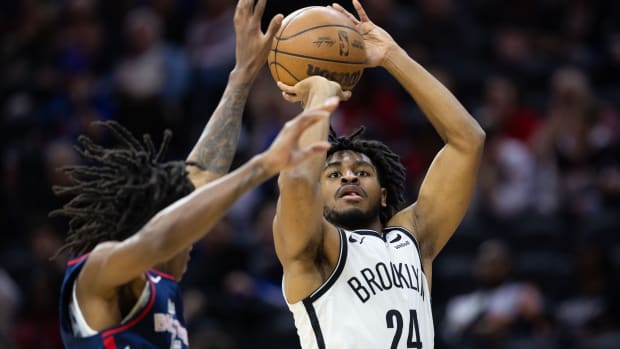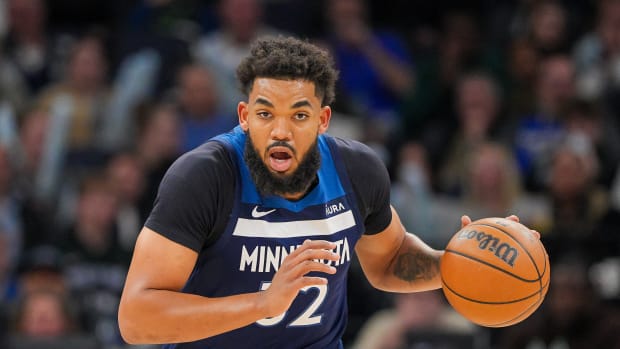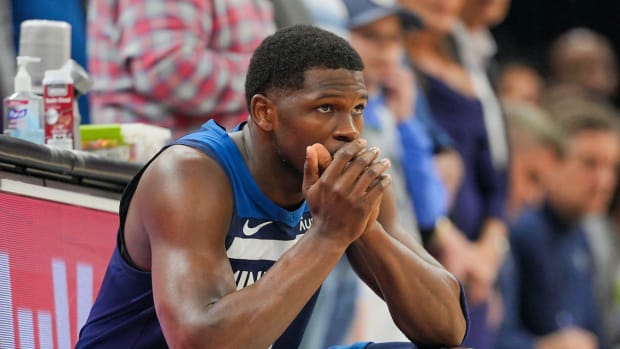Who Wants To Bet On De'Aaron Fox?
What follows are 21 notes and anecdotes from a day shadowing De'Aaron Fox last month. Why 21? Let's call it an homage to The Big Fundamental,The Big Ticket, and three-point shooting.
1. De'Aaron Fox had my attention as soon as I found out that Kevin Garnett was his favorite player growing up. I'd never heard a young player name KG when that question's been asked. Certainly not a guard. "I’ve heard some stories," Fox explains the morning we first meet. "Every one talks about how intense he is. Even when he was done playing, he’s still that same intense person. I don’t know what I’d say, but I want to meet him."
Honestly, this isn't good enough for me. I need to know more. But shortly after Fox finishes that answer, we are informed that things are already behind schedule for the day, and he needs to get to the court. Frustrating start to the day.
2017 NBA Mock Draft 5.0: All Eyes On Lonzo And The Lakers
2. I came to Thousand Oaks because Fox is probably the most interesting player in the NBA draft. His ceiling is as high as anyone in the lottery. But his floor is also lower than most of his peers. It's a gamble.
Think of it as the difference between John Wall and Elfrid Payton. If he's Wall, his jump shot will improve just enough to make him completely unstoppable. That version of Fox can go a long way toward reinventing the identity of a team that's currently hopeless enough to be picking in the top five. Or, if he's Payton, his jump shot will never quite get there, and a team could lose five years waiting to see if he can turn the corner. Those are the stakes for whichever franchise drafts him next Thursday.
3. Fox isn't worried about draft night reactions. "You’ll have some people that’s hot," he says, "But then you’ll have a lot of people that’s like, 'Ohhhh, that’s a great pick.'"
"You gotta remember the Knicks. Remember they was booing for Porzingis? Now they’re his biggest fans." Fox waves his arms, channeling Knicks fans everywhere: "Oh my God, Porzingod. We need to get someone to help Porzingod."
Fox's trainer, Chris Gaston, cracks: "Porzingod worn out, bruh."
"You just got to go out and perform," Fox says. "That’s what Porzingis did. Now everybody loves him. I’ve never seen a Knicks fan that doesn’t like Porzingis. They’re going to burn down Madison Square Garden if Porzingis gets traded."
4. Fox was born in New Orleans, but raised in Houston. He is the second son of Aaron Fox, a former college football player at Fort Hays State, and Lorraine Fox, a former college basketball player at Arkansas Little-Rock. His Dad never forced football on him, and his Mom doesn't bother him with too much basketball talk, although sometimes she sends spontaneous texts during games. "I'll come back have a text from like two hours ago," Fox says. "Five minutes into the first half. Like, did you expect me to read this during the game?" In any case, if you're looking to explain how Fox became the best athlete in this June's draft, start with his parents.
In high school, he was an undersized lefty playing above his age group in the summers, on the same AAU team as Justise Winslow, Kelly Oubre, and UNC star Justin Jackson. And growing up with Winslow and Oubre as role models—this is how I'll choose to explain the best hair in the draft.
Meeting Markelle Fultz: A Day With The NBA's (Likely) No. 1 Pick
5. Instead of going home to Houston after finishing the academic year at Kentucky, Fox came to Thousand Oaks, Calif. to train at The Sports Academy, a state of the art complex that hosts athletes year-round. He's been putting in three-a-days for the better part of two months. He wakes up every day around 7 a.m. "But I'm not moving until 8," he says. Then there are general on-court drills at 9:30, and a break afterward. Then a workout in the weight room, and lunch in the afternoon, and another break. Late in the day he'll return for shooting. Only shooting.
6. At Kentucky, Fox shot 21% from three. He knows that when it comes to his NBA future, there's really only one question to answer. "What I tell teams," he says, "I'm always in the gym. Kentucky was just a bad year shooting for me. I shot the ball well from the free throw line, that’s one thing a lot of people really look at. I don’t really know why—I’ve never been a bad shooter, but I did have a bad year. I’m going to work on it. I’m already used to the NBA three, been shooting it well during workouts. Honestly, only time can tell. I’m gonna to have to prove it in games."
7. When you watch him up close, the first thing you wonder about has nothing to do with his jumper. It's his frame. He's got the kind of legs that make you worried for his safety, and baffled that he's actually a professional athlete. Keon Clark bones.
"When I recruited him," John Calipari says, "I'm like, 'Look at this dude's legs. He can't be this skinny.' And then all of the sudden, he went out there, and those skinny legs ran real fast. And he's tough. He'll go in and get banged, and he's fine."
The word Calipari uses is "wiriness," and it conjures very specific skills on a basketball court. It means initiating contact and absorbing it without a problem. Bouncing through a lane full of bigger bodies. Inexplicably holding up on defense against guys twice your size.
Those skills might be Fox's best asset early on in the NBA. It's one thing to be fast, but the key with Fox is that he's fearless. On defense he will hold his ground against almost anyone. On offense he can get into the lane at will, and he'll get to the line, too.
8. As for his speed, Fox is modest. "Guys like John [Wall], Russ [Westbrook]… John is like track fast, and track fast is different."
He's also pragmatic. "Running with the ball in my hand, I’m actually faster. Because if we’re just running, and you tell me to go run, I’m like, 'Bro, don’t tell me what to do.'"
"I have to feel like I’m running with a purpose," he says. "Say someone's chasing me. Or a dog, or... not a dog, I’m not scared of dogs. But like a tiger's chasing me. One, I'm not getting away, because if it's a tiger. But I would definitely run faster."
He thinks about it more. "Who do tigers hunt? Deer. All the deer has to do is try to avoid the tiger for like 17 seconds." Fox says he learned this watching Animal Planet with Malik Monk this year. I trust him. "If the tiger can’t get it for the first 20 seconds, it’ll stop. Like he will literally just sit there and lay down. The tiger's going to stop because its heart will overheat."
9. "Wow," is what Monk remembers from his first encounter with his future teammate. "I'd never seen someone move that fast on the court." Jonathan Motley, a fellow draft prospect working out with Fox in California, echoes the point. "His explosiveness," Motley says. "He's a rocket, man."
He's drawn comparisons to John Wall, Mike Conley, and Tony Parker. Fox adds Nick Van Exel to the mix, another lefty. "Nick the Quick was nice," he says. But then, it always comes back to Wall.
"He does it all," Wall told Comcast SportsNet of Fox during an exit interview after the NBA Playoffs. "He plays at his own pace, can shoot the three, post up, pass, athletic. People will say I'm biased because of Kentucky, but I feel like he’s the best player in the draft. He reminds me a lot of myself."
"The reality of it is," Calipari says, "Unless [NBA teams] are trying to win in a minute, I mean, that [jumper] should be the least of their worries. What you have is a long guard that can pick up 94 feet, that'll be as fast as anybody in the league. When you have that, and he's really good at pick-and-roll, he's on the scouting report. 'How do we play this? How are we gonna guard this? What are we doing in transition?' He gets the ball in his hands, you gotta get back in the lane. Because he's coming."
10. When we talk about his time playing college basketball, Fox is effusive in his praise for the experience. He loved that Calipari promised him nothing, and he loved that Cal told him to come there preparing to stay two years. "And then if you can leave after one, you'll go," Calipari said last summer. There were only two frustrations at Kentucky.
The first involves the facilities. I'd always imagined a Kentucky basketball dorm experience that was like a college version of USA Basketball at the Olympics. Basically, living the dorm equivalent to that luxury cruise ship. But Fox corrects me when I mention it in passing.
"It's not as good as it could be," he says. He lists off the names of a handful of schools around the country that have upgraded facilities in the past few years. "But if Kentucky upgrades stuff, then the NCAA's like, 'Arrghh, you can't have this, you can't have that.'"
The second issue was the schedule. "I wish we played more guards," Fox says. "I wish we played Washington, or if we were to play Dennis [Smith]. Playing a point guard that should be drafted, it’s more on the table. It’s not knocking any teams, but like, Tennessee or Alabama, they’re good teams but they don’t have top prospects. You can have 40 against them, but people are going to write that game off like it was nothing, because you’re not playing against somebody."
11. Kentucky played somebody on March 24. Aside from the obvious implications for college basketball, UCLA-Kentucky in the Sweet 16 was probably the most anticipated NBA scouting opportunity of the season. Magic Johnson skipped Shaq's statue unveiling—for the Lakers, statue unveilings are like family reunions crossed with religious holidays—and got on a plane to Memphis, where he joined a hundred other representatives from around the NBA. Calipari chuckles about the game now.
"At halftime," he remembers, "I walk in, and I look at the team and go, 'Are you all watching this game?'"
He pointed to Fox.
"How 'bout we just play through him?"
The players all looked around, and Malik Monk laughed. "Put it in his hands," Monk said. "We'll play off him."
Fox dominated the entire night. He finished with 39 points on 13-of-20 shooting, besting his UCLA counterpart Lonzo Ball. He got to the rim at will, and he also went to the line 15 times. Months later, he says that the only people who recognize him in California are UCLA fans. "Aww, come on," they say, "You didn't have to do us like that."
In the most anticipated scouting event of the year, Kentucky's point guard was so dominant that the immediate response from NBA experts was to preach caution. The prevailing sentiment was that one night shouldn't change change evaluations that had taken shape over the course of five months. "Biggest game of the year" became "just one game."
12. "Kill mode all the time," is how Fox described his mindset before the UCLA game in March. "Shut Lavar Ball up," is how he explains it a few months later.
Of course, he says he had other motivations, too. UCLA fans were talking too much. And he always plays better in big games. And he loved Kentucky. When they lost to North Carolina two days later, he was in tears in the locker room as his career came to an end.
He's still cool with Lonzo and his brothers. The elder Ball was just a puzzling wrinkle that added some motivation along the way. "In the last year, he became relevant for some reason," Fox says. "When I knew Lonzo in high school, I’d never seen his dad before. He went crazy this year. I guess when your son a lottery pick, that gives you a lot of confidence."
13. That tournament game was the first time Fox became a fixture in every conversation surrounding the top four or five prospects in this draft. He's been there ever since. But if there's any debate between Ball and Fox specifically, it should be noted, the tournament game can only tell you so much.
Fox was taking advantage of the Bruins defense that had been horrific for the entire season, and most of the time he wasn't beating Lonzo specifically. On the other end, he bothered Ball more than anyone all year—he did the same thing when they played in December—but even that detail is only so useful. Fox's athleticism is similar to what Ball will see every night in the NBA. If a team believes in Ball, they have to imagine that eventually he'll adjust to the athleticism he saw from Kentucky. Writing him off because of one matchup would be insanity.
The Case For: Lonzo Ball, The Draft's Best Guard
The UCLA game works much better as a window into the player Fox can be if his offense evolves. When his floaters in the lane are falling, when he's leading the break, when he's hitting from outside, setting the tone defensively... he can take over the entire game. He's like a force of nature. Like Wall, like Westbrook. When his shots are falling or he's getting to the rim, there are no answers. That's the part that shouldn't be downplayed. With the entire NBA scouting community watching a game with as many as seven potential lottery picks on the court, Fox looked like he was in a different category than all of them. That matters.
14. As for Lonzo, around a table with Fox, his long-time trainer, and his father, the panel agrees that Ball will be fine in the NBA. But next year could be tough. "He put a target on his neck," Fox says. Everyone will be coming.
"Not just the great point guards," he says. "Every point guard. Like Patrick Beverley's not going to do it offensively, but he's gonna be like, 'Yo this kid's not about to get past halfcourt.'"
And then somehow—I'm still not sure how—this turns into a discussion of Patrick Beverley through the decades. "You take Patrick Beverley's exact game right now," Fox declares, "Put him in the 60’s, he’d be the best player in the league."
"You can’t compare eras," Fox says. "You can’t compare a cell phone now to a cell phone 10 years ago. Everything gets better with time."
"Imagine Kyrie playing in the 50’s. Everybody’s shoes getting crossed off, and he’s going to average 40 from the point guard position."
15. Speaking of generation gaps: Fox has a relationship with technology that makes me feel old. He plays video games up to six hours per day. He owns an E-Sports gaming chair that he uses regularly. He is not a beach person and hasn't spent time in Malibu, but he says he'd consider it if he could hook up his Playstation. And when we actually turn on a Playstation 4 and play, Fox dominates me, repeatedly, in a UFC game.
On social media, he's as active as anyone else in 2017, but he stays detached from trolls. "People are like, 'How do you not let that stuff get to you?' I'm about to make a million dollars. Why the hell would I care what they say? I enjoy what I do. I'm about to play basketball for a living. Why should I care what anybody's saying?"
"You should see when I go on IG live," he says. "Someone says something critical, and I'll always pin it. Then people be like, 'Ahhhhhh report him! He's a douchebag!' It's hilarious."
16. The best summary of Fox off the court: He keeps a low profile. He's funny. He's kind of a huge nerd, but he's completely at ease with himself. Those are always the coolest people.
17. Back at lunch, we discuss potential NBA landing spots. Fox is intrigued by playing in Phoenix and joining Devin Booker, along with a team full of Kentucky guards. He's obviously thinking of the Lakers as well. "I've heard they're trying to move D'Angelo to the 2," he says. "Even if he does play point, I feel like we could play together. A lot of teams play two point guards anyway."
Of course, he knows Lonzo is still the most likely answer in L.A. "That's the safe pick."
There are also the Kings. "Yeah, we can do Sacramento," Fox's father says. "Laid back, relaxed. And then if you want to ride to San Francisco and the big city, the bridge is right there. And hey, Skal Labissiere came in and played well once Boogie left."
Gaston adds, "They were all scared of Boogie. Every last one of them players. He used to punk everybody."
His father laughs, "Man, I'd be traded. Me and Boogie would be going at it. F--- that."
Meanwhile, Fox is scrolling through his mentions. Earlier in the day, he took the "How well do you know De'Aaron Fox?" quiz that the Kings put together and scored a 100%. He tweeted his results. It has now unleashed a flood of fans begging him to come to Sactown. "They got some crazy fans," he says with a smirk.
18. Driving back from lunch, Fox talks about the pre-draft interviews. One team asked him whether he accelerates or brakes at a yellow light. "I’m like, sometimes I would hit the gas, sometimes I’ll brake." The same team then asked whether he'd send back food at a restaurant if he was given the wrong order. "If it was something that was close," Fox said, "I wouldn’t. Because I think waiters really be spitting in people’s food."
"If it’s not close, then yeah, I’m going to tell them bring it back. Like, give me what I ordered. But nicely, though."
When an SI cameraman says that his mother sends food back if it's even slightly off, Fox says, "Yeah, nah, that would piss me off. She sent it back because it was two degrees below how she wanted it. I would spit in her food." It's unclear what this answer would mean to NBA teams. But then we approach a yellow light, and Fox guns the engine of his rented Dodge Challenger, and we sail through as it turns red. I think this passes the test?
19. As the yellow light riddles imply, the draft is not an exact science. Especially as the lottery has come to be dominated by freshmen, general managers are making franchise-altering decisions with little more than four-and-a-half months of college basketball to analyze. Everyone is basically guessing at who will develop, and how.
That might be the best argument for Fox as a potential franchise player. Compared to players like Ball and Markelle Fultz, yes, there are holes in his game that would seem to limit his ceiling. But the progression of NBA stars rarely follows a linear curve. For every Durant or LeBron who arrive with greatness preordained, there is a Steph Curry, Paul George, Kawhi Leonard, and Russell Westbrook. Fox already has a mentality that will set him apart from most of his peers. And while some of his competition in this class looks more refined, there's also a chance that Fox is just scratching the surface.
2017 NBA Draft Sleepers: Six Guards To Watch
The outside shooting issues were real at Kentucky, but he was better in high school. Gaston, the trainer who's worked with him since the eighth grade, thinks that the problem may have been confidence. He got out of rhythm on the perimeter, and never got it back.
More importantly, focusing on the season's shooting numbers might be missing the real takeaway the four-and-a-half months at Kentucky. Fox struggled to get acclimated early on, and he battled nagging injuries through the first few months. Then he took over through the second half of the season. The UCLA performance may have been the headliner, but he averaged 21 points on 52% shooting during eight games in March. He was excellent on both ends. If that's the player he's going to become, he'll be a problem for everyone.
20. The case against Fox is easy. He couldn't shoot from the outside at Kentucky, which means he probably won't be able to shoot from the outside in the NBA, which means there's a ceiling on what he can do in today's league. Almost every time an NBA team plays the "if he gets a jumpshot" game, it ends with disappointment. To some prospective fan bases, Fox is easy to dismiss for that reason alone.
But again, it's the draft. Conventional wisdom is never more useless than when the whole basketball world is talking about teenagers.
21. "You gotta be a dog," Fox says about life in the NBA. "Don't back down from anyone. You gotta be one of those guys that people don't want to play against—and those are the guys that people want to play with."
"Teams ask me what I can bring to the table: Good guy, leadership, play-making offensively and defensively. Then they ask, 'What are you gonna do if we put the ball in your hands?' I'm going to take over the game."
"It doesn't necessarily have to be scoring. Just always attacking. Always. People don't wanna guard somebody that's gonna attack them on literally every possession. They want to take plays off on defense. They don't want someone guarding them that actually wants to guard. If you have somebody coming at you, every single possession, you can't get that break."
This is a good answer. Nobody can say for sure whether De'Aaron Fox will succeed in the NBA, but I definitely understand why Kevin Garnett is his favorite player.



































